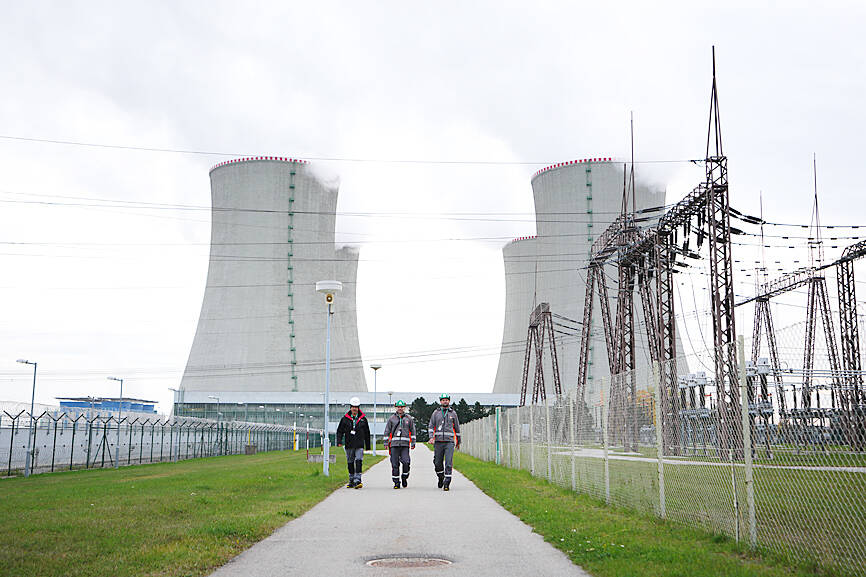The eight huge cooling towers of the Dukovany power plant overlook a construction site for two more reactors, as the Czech Republic pushes ahead with plans to expand its reliance on nuclear energy.
Mobile drilling rigs have been extracting samples 140m below ground for a geological survey to make sure the site is suitable for a US$19 billion project as part of the expansion that should eventually at least double the country’s nuclear output and cement its place among Europe’s most nuclear-dependent nations.
South Korea’s KHNP beat France’s EDF in a tender to construct a new plant whose two reactors would have an output of more than 1,000 megawatts (MW) each. After becoming operational in the second half of 2030s, they would complement Dukovany’s four 512MW reactors from the 1980s.

Photo: AP
The KHNP deal gives the Czechs an option to have two more units built at the other nuclear plant in Temelin, which has two 1,000MW reactors. Then, they are set to follow up with small modular nuclear reactors.
“Nuclear will generate between 50 percent and 60 percent around 2050 in the Czech Republic, or maybe slightly more,” Dukovany project chief executive Petr Zavodsky told an interview.
The nuclear expansion is needed to help the country wean itself off fossil fuels, secure steady and reliable supplies at a reasonable price, meet low emission requirements and enable robust demand for electricity expected in the coming years to power data centers and electric cars, Zavodsky said.
The Czech expansion comes at a time when surging energy demand and looming deadlines by countries and companies to sharply cut carbon pollution are helping revive interest in nuclear technology. While nuclear power does produce waste, it does not produce greenhouse gas emissions, like carbon dioxide, the main driver of climate change.
The EU has accepted nuclear by including it in the classification system for environmentally sustainable economic activities, opening the door to financing. That has been a boost for the Czech Republic, Slovakia, Hungary and France — the continent’s nuclear leader — that have heavily relied on nuclear.
Belgium and Sweden recently scrapped plans to phase out nuclear power. Denmark and Italy are reconsidering its use, while Poland is set to join a club of 12 nuclear-friendly nations in the EU after signing a deal with US-based Westinghouse to build three nuclear units.
The EU generated 24 percent of nuclear electricity last year.
Britain signed a cooperation deal with the US in September that British Secretary of State for Energy and Climate Change Ed Miliband said would lead to “a golden age of nuclear in this country.”
It would also invest £14.2 billion (US$18.7 billion) to build the Sizewell C nuclear power plant, the first in the UK since 1995.
CEZ, the dominant Czech power company in which the government holds a 70 percent stake, and Britain’s Rolls-Royce SMR have agreed on a strategic partnership to develop and deploy small modular nuclear reactors.
The cost of the Dukovany project is estimated at more than US$19 billion, with the government agreeing to acquire an 80 percent majority in the new plant. The government is to secure a loan for the new units that CEZ would repay over 30 years. The state would also guarantee a stable income from the electricity production for CEZ for 40 years. Approval is expected to be granted by the EU, which aims to become “climate-neutral” by 2050.
“We’re in a good position to argue that we won’t be able to do without new nuclear units,” Zavodsky said. “Today, we get some 40 percent electricity from nuclear, but we also currently get another 40 percent from coal. It’s clear we have to replace the coal.”
Russian energy giant Rosatom and China’s CNG were excluded from the Dukovany tender on security grounds following the Kremlin’s invasion of Ukraine.
CEZ signed a deal with Westinghouse and France’s Framatome to supply nuclear fuel for its two nuclear plants, eliminating the country’s dependence on Russia. The contract with KHNP secures fuel supplies for 10 years.
While atomic energy enjoys public support, skeptical voices can be heard at home and abroad.
The Friends of the Earth say it is too costly and the money could be better used for improving the industry. The country also still does not have a permanent storage for spent fuel.
The Dukovany and Temelin plants are located near the border with Austria, which abandoned nuclear energy after the 1986 Chernobyl nuclear explosion. In 2000, a dispute over the Temelin plant resulted in a political crisis and blocked border crossings for weeks.
Austria remains the most nuclear-skeptical EU country and its lower house of parliament has already rejected the Czech small modular reactors plan.

Philippine President Ferdinand Marcos Jr yesterday vowed that those behind bogus flood control projects would be arrested before Christmas, days after deadly back-to-back typhoons left swathes of the country underwater. Scores of construction firm owners, government officials and lawmakers — including Marcos’ cousin congressman — have been accused of pocketing funds for substandard or so-called “ghost” infrastructure projects. The Philippine Department of Finance has estimated the nation’s economy lost up to 118.5 billion pesos (US$2 billion) since 2023 due to corruption in flood control projects. Criminal cases against most of the people implicated are nearly complete, Marcos told reporters. “We don’t file cases for

Ecuadorans are today to vote on whether to allow the return of foreign military bases and the drafting of a new constitution that could give the country’s president more power. Voters are to decide on the presence of foreign military bases, which have been banned on Ecuadoran soil since 2008. A “yes” vote would likely bring the return of the US military to the Manta air base on the Pacific coast — once a hub for US anti-drug operations. Other questions concern ending public funding for political parties, reducing the number of lawmakers and creating an elected body that would

‘ATTACK ON CIVILIZATION’: The culture ministry released drawings of six missing statues representing the Roman goddess of Venus, the tallest of which was 40cm Investigators believe that the theft of several ancient statues dating back to the Roman era from Syria’s national museum was likely the work of an individual, not an organized gang, officials said on Wednesday. The National Museum of Damascus was closed after the heist was discovered early on Monday. The museum had reopened in January as the country recovers from a 14-year civil war and the fall of the 54-year al-Assad dynasty last year. On Wednesday, a security vehicle was parked outside the main gate of the museum in central Damascus while security guards stood nearby. People were not allowed in because

Tanzanian politicians are in shock over the massacre of hundreds of young protesters during its recent election, insiders told Agence France-Presse, but are too afraid to speak out as a tiny cabal around the president takes control. Gruesome images of dead Tanzanians have flooded the Internet in the wake of the Oct. 29 elections that triggered widespread protests over government repression. Tanzanian President Samia Suluhu Hassan officially won with 98 percent of the vote, but key opposition leaders were jailed or disqualified. The opposition said that more than 1,000 people were killed as security forces crushed the protests under cover of a five-day